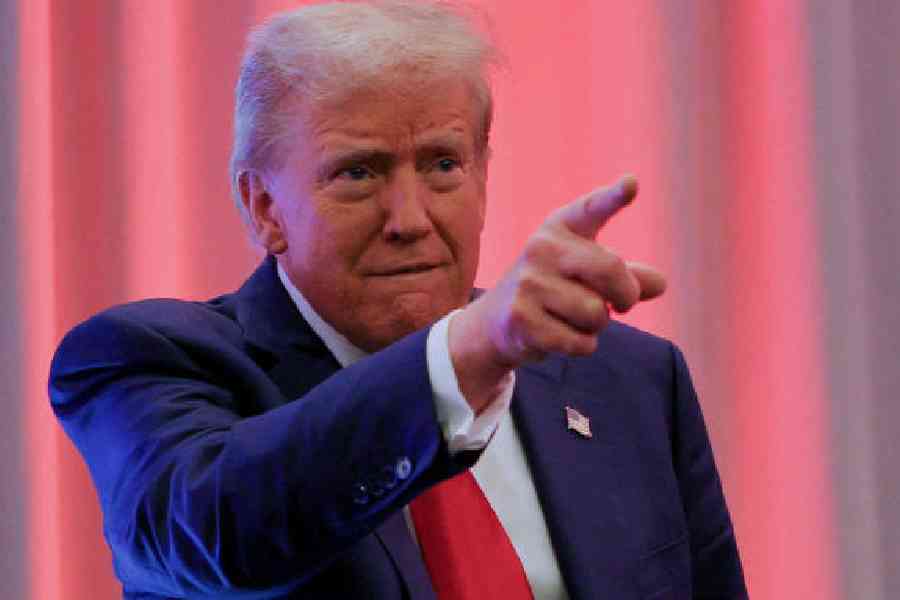President-elect Donald J. Trump is keeping secret the names of the donors who are funding his transition effort, a break from tradition that could make it impossible to see what interest groups, businesses or wealthy people are helping launch his second term.
Trump has so far declined to sign an agreement with the Biden administration that imposes strict limits on that fund-raising in exchange for up to $7.2 million in federal funds earmarked for the transition. By dodging the agreement, Trump can raise unlimited amounts of money from unknown donors to pay for the staff, travel and office space involved in preparing to take over the government.
Trump is the first President-elect to sidestep the restrictions, provoking alarm among ethics experts.
Those seeking to curry favour with the incoming administration now have the opportunity to donate directly to the winning candidate without their names or potential conflicts ever entering the public sphere. And unlike with campaign contributions, foreign nationals are allowed to donate to the transition.
“When the money isn’t disclosed, it’s not clear how much everybody is giving, who is giving it and what they are getting in return for their donations,” said Heath Brown, a professor of public policy at John Jay College of Criminal Justice who studies presidential transitions. “It’s an area where the vast majority of Americans would agree that they want to know who is paying that bill.”
Trump’s transition team, led by Linda McMahon and Howard Lutnick, both of whom were nominated to cabinet positions last week, has repeatedly said it intends to sign the agreements with the Biden administration, known as memorandums of understanding.
But it blew past deadlines to do so in September and October, and nothing has indicated progress being made to that end in the two weeks since the election. The White House, which is obliged to offer the agreements to presidential candidates under a federal law known as the Presidential Transition Act, has said it is ready to assist the Trump transition to ensure a smooth handover of power.
On Thursday, Senator Elizabeth Warren, Democrat of Massachusetts, sent a letter to the Biden administration, raising concerns that the Trump transition’s failure to sign the agreements was “uncharted territory” that “threatens the American public”. She asked for an accounting of how the administration was engaging with the Trump transition on the agreements.
“The Trump-Vance transition lawyers continue to constructively engage with the Biden-Harris administration lawyers regarding all agreements contemplated by the Presidential Transition Act,” Brian Hughes, a Trump transition spokesman, said in a statement responding to queries about the status of negotiations with the Biden administration.
Transition efforts help the President-elect with the complex task of taking over the federal government, including selecting thousands of potential political appointees. Previous transitions, including Trump’s before his first term, have signed the agreements.
Trump’s transition team, formally known as Trump Vance 2025 Transition Inc., has revealed nothing about how much money it hopes to raise, who has contributed to the fund or how it is spending the money.
The current Trump transition, like its predecessors, is set up as a “dark money” nonprofit. Those groups typically do not have to disclose their donors, even to the Internal Revenue Service. But unlike Trump’s team this year, earlier transitions accepted financial support from the General Services Administration, which oversees much of the transition process. In exchange for that federal money, they agreed to conditions that other dark-money nonprofits do not have to follow, like capping individual contributions at $5,000 and disclosing the names of their donors.
When Barack Obama won the presidency in 2008, his transition raised $4.5 million while restricting donations to a maximum of $5,000, and pledging to refuse money from corporations, labour unions, political action committees, lobbyists and registered foreign agents. Nearly 60,000 people contributed, with an average donation of about $75.
In 2020, the Biden transition set a fund-raising goal of $7 million and brought in seasoned Democratic fund-raisers to help. But when the General Services Administration, spurred on by Trump’s false claims that he had won the election, withheld government funding for weeks, private donations flooded in.
By the time of the inauguration, Biden’s team had raised more than $22 million, with 450 employees on its books. Its disclosure report, released in February 2021, was over 1,000 pages.
Before the 2016 election, Trump relied on former governor Chris Christie, Republican of New Jersey, to run his transition. But, as the journalist Bob Woodward later reported, when Trump discovered that Christie had been raising money to pay for that venture, Trump accused him of “stealing” from his campaign and “jinxing” his chances.
Trump fired Christie immediately after the election, replacing him with his running mate, Mike Pence.
The 2016 Trump transition, which did sign the agreement with the General Services Administration, had roughly 120 employees and ultimately disclosed raising $6.5 million and receiving $2.4 million in federal reimbursements. Trump used office space in Trump Tower to interview candidates during the transition, and filings show that his transition spent $258,000 on “rent and utilities”, though not who was paid.
In 2018, that transition donated $150,000 in leftover money to another dark-money nonprofit, the 45 Alliance, which was meant to help Trump’s appointees and reportedly held a reception for them at what was then Trump’s hotel in Washington.
The 2016 transition also paid some $1.8 million in legal fees, much of which was spent after Trump had been sworn in as President.
As with campaign donations, contributions to inaugural funds are regulated by the Federal Election Commission, which requires the inaugural committee to file detailed lists of donors. It also prohibits donations from foreign nationals.
Transition funding is not regulated by the FEC and IRS rules permit the nonprofits in question to accept donations from foreigners without public disclosure.
New York Times News Service











